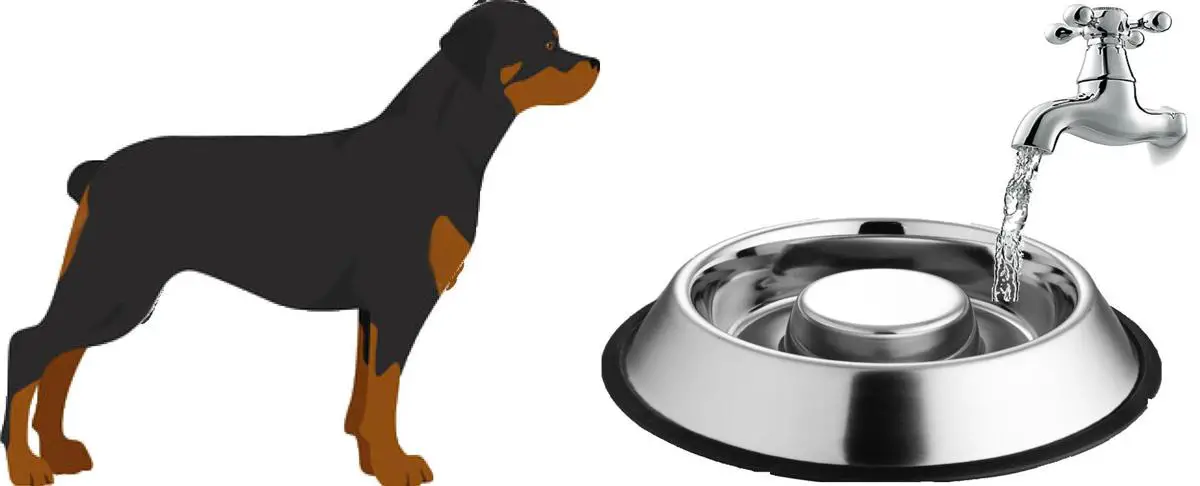Quick Links: Table of Contents
- Rottweiler Breed Overview
- History of the Rottweiler Breed. Where Rottweilers came from
- What the Rottweiler Looks Like
- How Much is the Rottweiler Puppy?
- Best Rottweiler Breeders
- Adopting or Rescuing the Rottweiler
- Rottweiler Growth
- The Temperament of the Rottweiler
- How Long Rottweilers Live
- Rottweiler Litter Size
- How Fast Rottweilers Can Run
- Good Names for Rottweilers
- How Intelligent are Rottweilers?
- How Popular are Rottweilers with New Dog Owners?
- Health Problems in Rottweilers and How to Prevent Them
- How to Take Care of Rottweiler
- Dog Breeds That Are Similar to Rottweilers
- Other Things to Know About Rottweilers
Rottweiler Breed Overview
The Rottweiler is a medium-sized dog.
The adult Rottweiler stands 22 to 27 inches tall at the shoulder.
The Rottweiler belongs to the Working Dogs group.
Dogs in the Working Dogs group, like the Rottweiler, were developed to assist humans in some capacity – including pulling sleds and carts, guarding flocks, guarding homes, and protecting their families.
Breeds in the Working Group are known for their imposing stature, strength, intelligence, and fearless.
Because of their size and strength, working dogs require a structured home life and firm, fair, consistent training by someone who can provide leadership without resorting to anger or physical force.
The fact that the Rottweiler belongs to the Working Dogs group is one of the reasons why Rottweilers have the personality and temperament that they have.
The temperament of the Rottweiler is generally described as:
- Alert
- Calm
- Confident
- Courageous
- Devoted
- Fearless
- Good-natured
- Obedient
- Self-assured
- Steady
History of the Rottweiler Breed. Where Rottweilers came from
The Rottweiler is thought to have evolved around 74 AD, when Roman soldiers from the 11th Legion of the Roman Empire settled in the Wurttemberg region of Germany.
They crossed German Shepherds with the Roman drover dogs or Mastiffs they had brought with them to herd cattle and guard the camp, resulting in a large and powerful dog capable of controlling large bulls.
This area became known as “das Rote Wil,” which referred to the town`s red roof tiles, and has since evolved into Rottweil, giving the breed its name.
Originally used to drive cattle herds during the day and guard them at night, Rottweilers were later used to pull carts and wagons and even hunt.
.
What the Rottweiler Looks Like
This medium to large dog has a stocky, solid, and slightly longer than tall frame with a strong, yet compact frame.
Males are typically larger, while females are more feminine, but both sexes exhibit bravery, power, and agility.
A medium-sized, broad skull with strong jaws, a scissor bite, and a broad muzzle.
The almond-shaped, dark brown eyes are properly proportioned and have an alert expression.
The ears are triangular in shape and hang close to the cheek.
A broad chest leads to muscular legs with round, compact, well-arched toes.
The rear dewclaws and tail are frequently removed, usually to the first or second vertebrae.
The Rottweiler has two coats.
The outer coat is made up of medium-length hair that is flat, coarse, dense, and curly.
.
How Much is the Rottweiler Puppy?

The average price of a Rottweiler puppy is $1740. The price of a Rottweiler puppy ranges from $1300 to $2000.
A lot of factors determine the price of the Rottweiler. These factors include what health records the Rottweiler puppy has, the lineage of the Rottweiler puppy, the US state the breeder is located in, etc.
To estimate how much you can expect to pay for a puppy Rottweiler based on the many factors that determine the price of the Rottweiler puppy, check out our calculator that lets you estimate how much you should expect to pay for the Rottweiler puppy based on what you want in the puppy.
When looking to buy a puppy, look at buying a puppy only from well-established breeders that breed puppies primarily for the love of the Rottweiler breed, and secondarily for profit. Do not buy a puppy from a puppy mill. Puppy mills mass-produce puppies in bad living conditions for maximum profit.
You may also consider adopting instead of buying a puppy. Adoption costs are very low compared to the price of a puppy.
Best Rottweiler Breeders
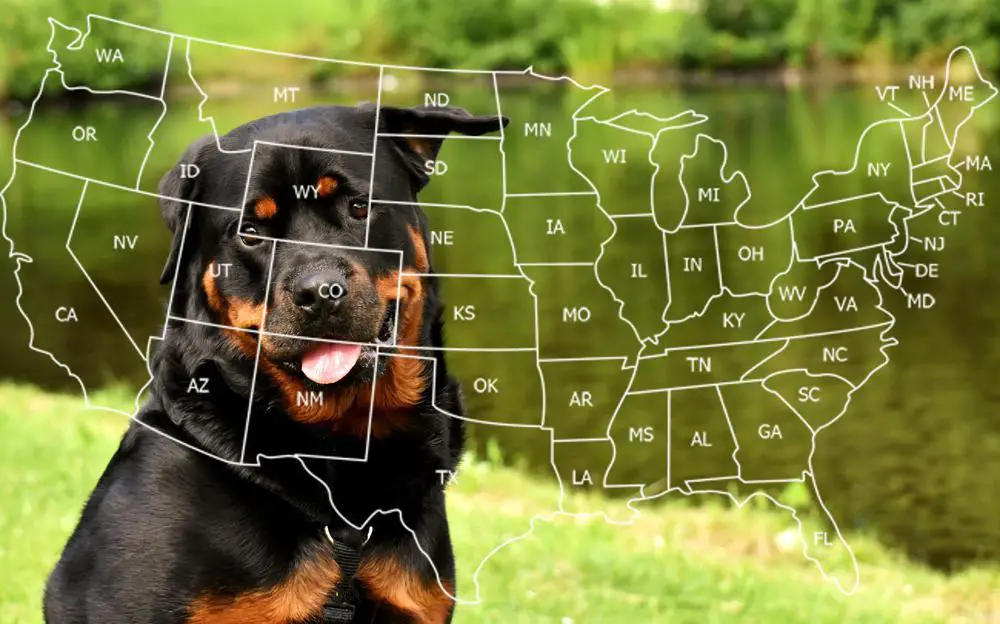
We have researched reputable Rottweiler breeders that you can buy a puppy.
Go to this page for our complete list of reputable Rottweiler breeders in various states in the United States.
On this page, you will see how much these breeders sell their puppies for, and how many puppies they have available.
A few of these breeders are listed below.
Von Ing Eastern European Rottweilers
Puppy Price: $1500.00
Natalie Hess
Puppy Price: $1500
All About Rotts
Puppy Price: $1250.00
Humberto Aguirre
Puppy Price: $1800
Von HarrisHaus Golden Rottweilers
Puppy Price: Check with breeder
Adopting or Rescuing the Rottweiler
You may consider adopting a dog instead of buying a puppy. Many dogs, Rottweilers included, are currently available for adoption in your local dog shelters.
These helpless but adorable dogs are waiting in dog shelters hoping that someday someone will rescue them. Dog adoption costs are lesser than the cost of a new puppy. Dog adoption costs are usually around $300 or even less.
In addition to your local dog shelter, another good place to find dogs that are available for adoption is petfinder.com.
Below is an adorable Male Rottweiler named Pj that is currently available for adoption on Petfinder.com. You can find other lovely Rottweilers like Pj on pefinder.com.
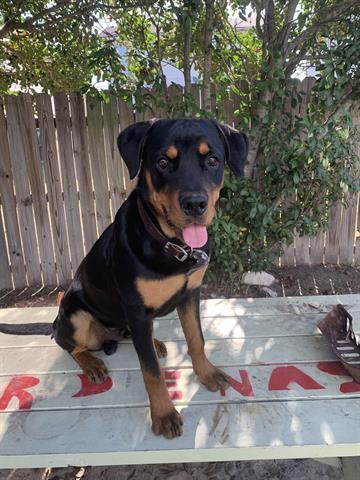
Buster is the name of another Rottweiler (Male) on petfinder.com that is looking for a new forever home.
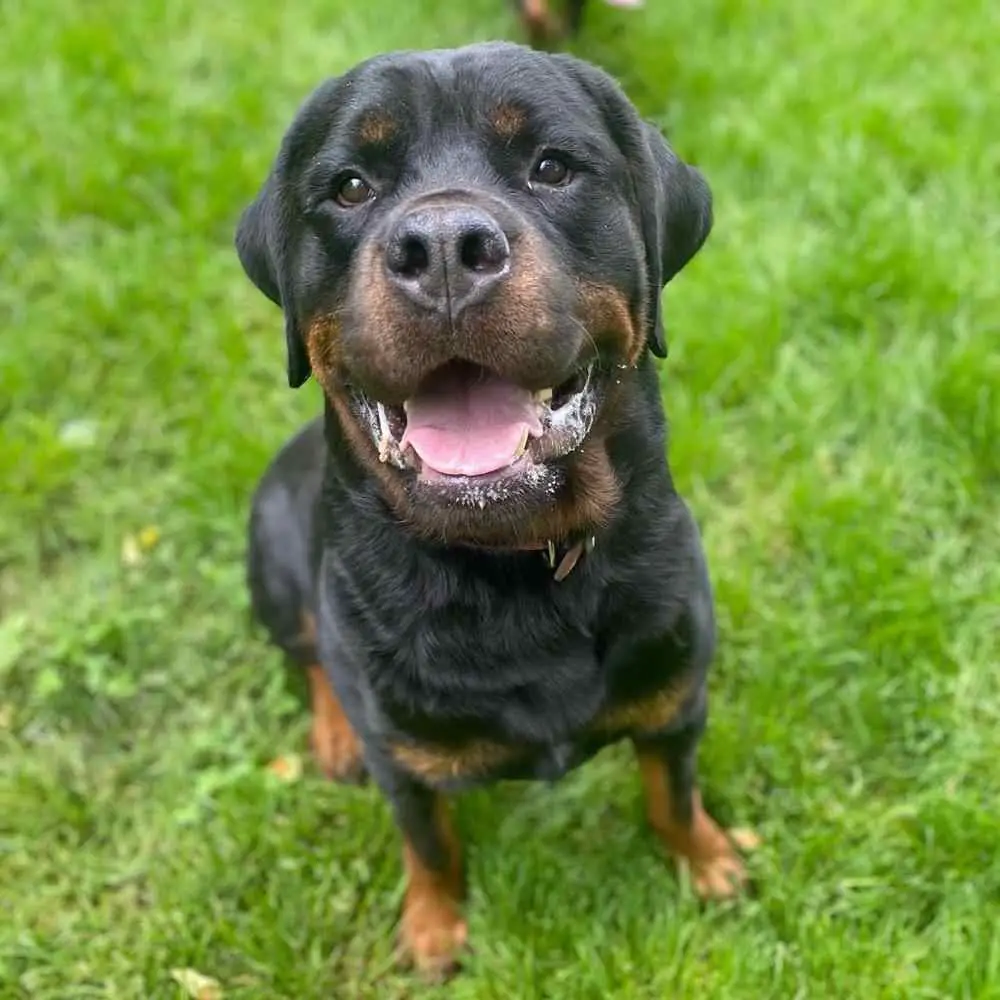
You can find more Rottweilers that are available for adoption on petfinder.
Rottweiler Growth

New Rottweiler owners need to know about the growth of their Rottweilers. This will help them plan their living spaces accordingly.
Also, knowing the typical growth pattern of the Rottweiler will help new owners catch the abnormal growth of their Rottweiler early.
See our calculator for predicting how big your Rottweiler puppy will get. You will also learn about the typical weight of the Rottweiler at different ages and how to catch abnormal growth in your Rottweiler
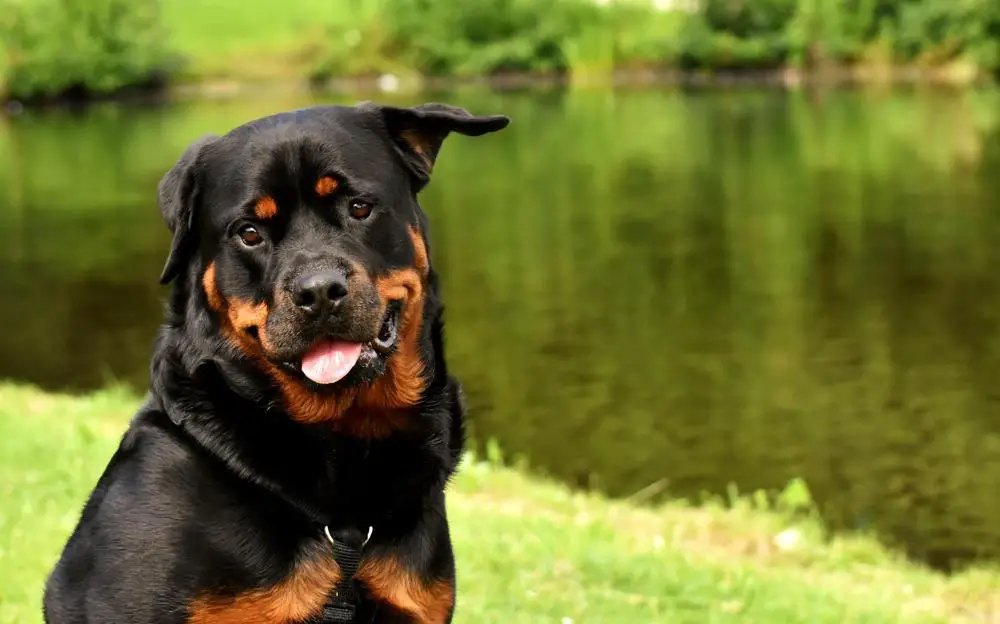
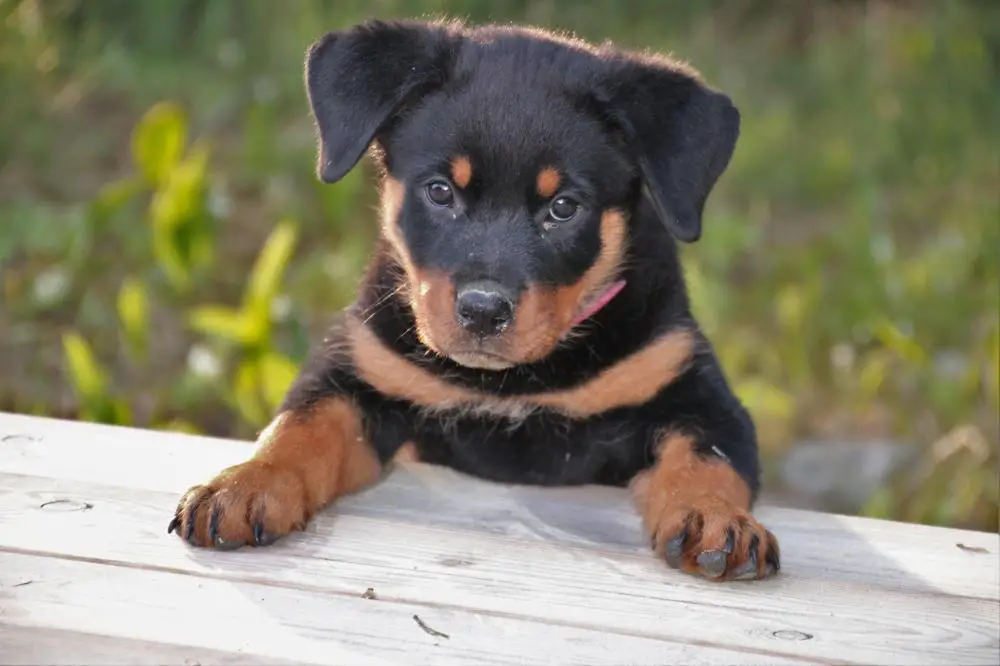
The Temperament of the Rottweiler
The temperament of the Rottweiler based can be summarized as in the table below.
The table shows the scores of the Rottweiler for 13 important dog behavioral factors.
We obtained these scores by analyzing raw data from the C-BARQ dog personality survey tool. The higher the score of a dog for a factor, the worse the temperament of the dog regarding that factor.
The C-BARQ tool was developed by researchers from the University of Pennsylvania, and it is a scientific tool that is used worldwide for reliably measuring the temperament of dog breeds.
See our complete analysis of the temperament of the Rottweiler here.
| Factor | Score |
|---|---|
| Stubbornness | 8.9 percent |
| Attachment Attention Seeking | 61.8 percent |
| Nonsocial Fear | 6.2 percent |
| Energy Level | 55.0 percent |
| Prey Drive | 44.3 percent |
| Dog Rivalry | 38.2 percent |
| Dog Directed Aggression | 36.9 percent |
| Stranger Directed Aggression | 36.8 percent |
| Excitability | 32.1 percent |
| Owner Directed Aggression | 17.4 percent |
| Separation Related Behavior | 17.3 percent |
| Touch Sensitivity | 16.8 percent |
| Dog Directed Fear | 13.6 percent |
| Stranger Directed Fear | 10.5 percent |

How Long Rottweilers Live
The lifespan of the Rottweiler is typically from 8 to 11 years.
Moreover, a few years back, veterinarian researchers performed a scientific study to determine the lifespan of the Rottweiler. In this study, the scientists collected data on how long 137 pet Rottweilers lived.
From the study, it was found that Rottweilers have an average lifespan of 8.92 years. Furthermore, the study found that it is not uncommon for Rottweilers to live as long as 16.7 years.
Note that you need to put in some effort if you want your Rottweiler to live long.
Rottweilers live long if they eat well, drink well, exercise well, and visit the veterinarian regularly.
There are also dog supplements that you can give your Rottweiler to improve your Rottweiler`s quality of their life.
Click here to learn more about how to make your Rottweiler live long.
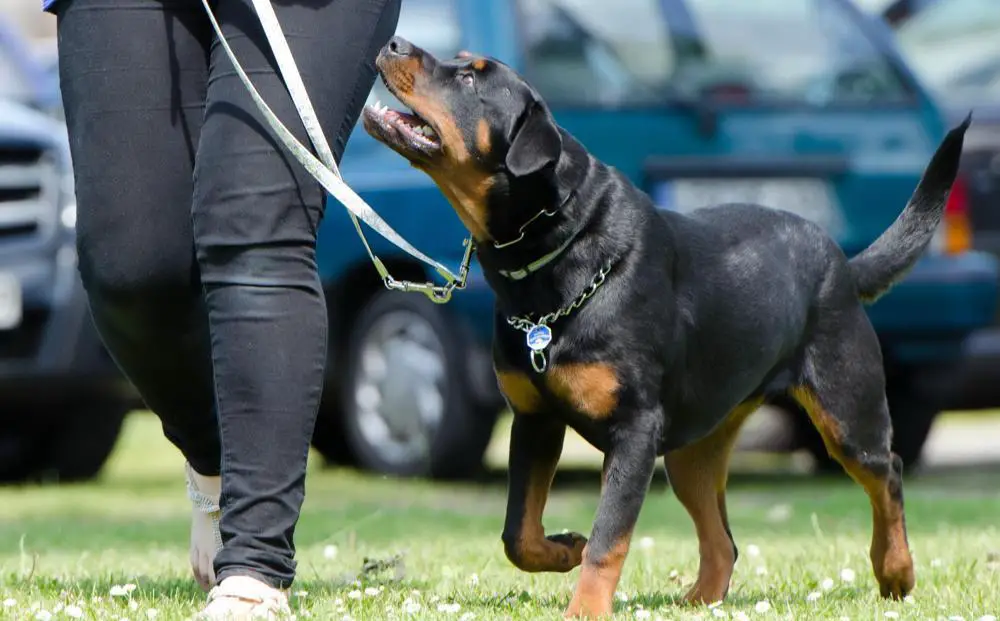
Rottweiler Litter Size
Researchers from the Norwegian School of Veterinary Science did a study where they counted the numbers of puppies in 214 different Rottweiler birth litters.
From this study, the researchers found that the average number of puppies that Rottweilers can have is 7 puppies. Also, the Rottweiler can have as few as 1 puppies per litter and as many as 14 puppies per litter.
The number of puppies that the Rottweiler will have depends on factors such as the age of the Rottweiler, the method of pregnancy, etc.
Click here to see our calculator for predicting how many puppies your Rottweiler will have and how the litter size of the Rottweiler compares to the litter size of other dog breeds.
How Fast Rottweilers Can Run
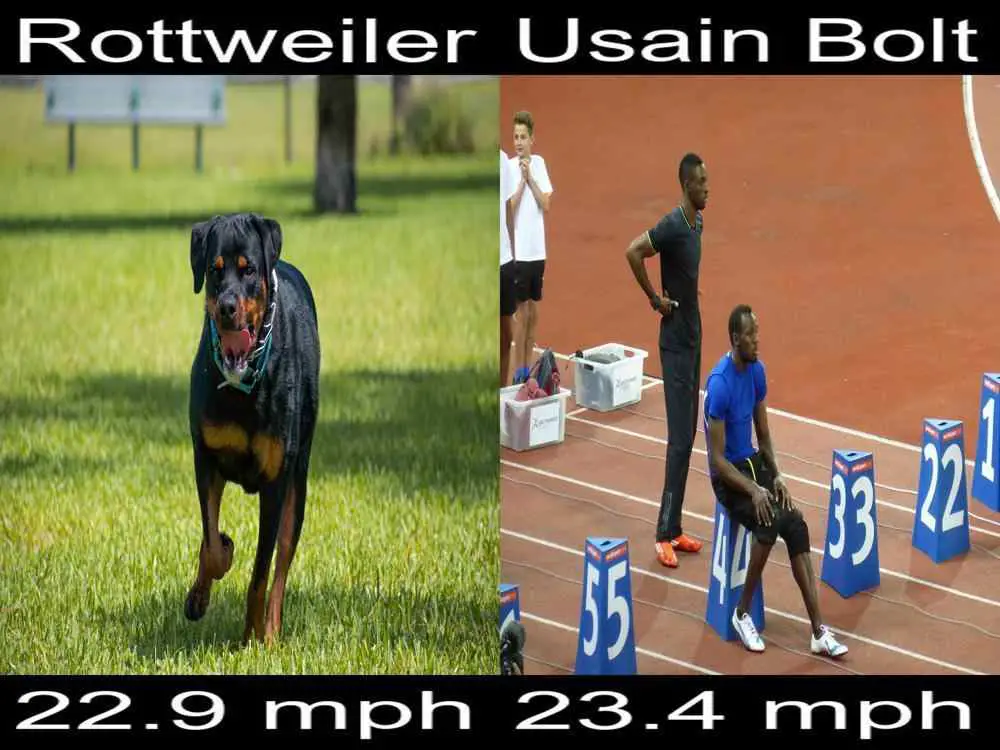
How fast a dog breed can run is a good measure of how athletic the dog breed is.
The American Kennel Club (AKC) regularly conducts dog running competitions. The AKC records the running speed of competing dogs in these competitions. These competitions are open to all dog breeds.
Based on our analysis of the speeds of 266 different Rottweilers, the average speed of the Rottweiler is 22.9 mph (36.9 kmph).
The fastest speed on AKC record that the Rottweiler ran in a race is 28.42 mph (45.7 kmph) and the minimum speed on record in a race for a Rottweiler is 9.58 mph (15.4 kmph).
Click here to see how the speed of the Rottweiler compares to the speed of other dogs and other mammals such as cats, horses, humans, etc.
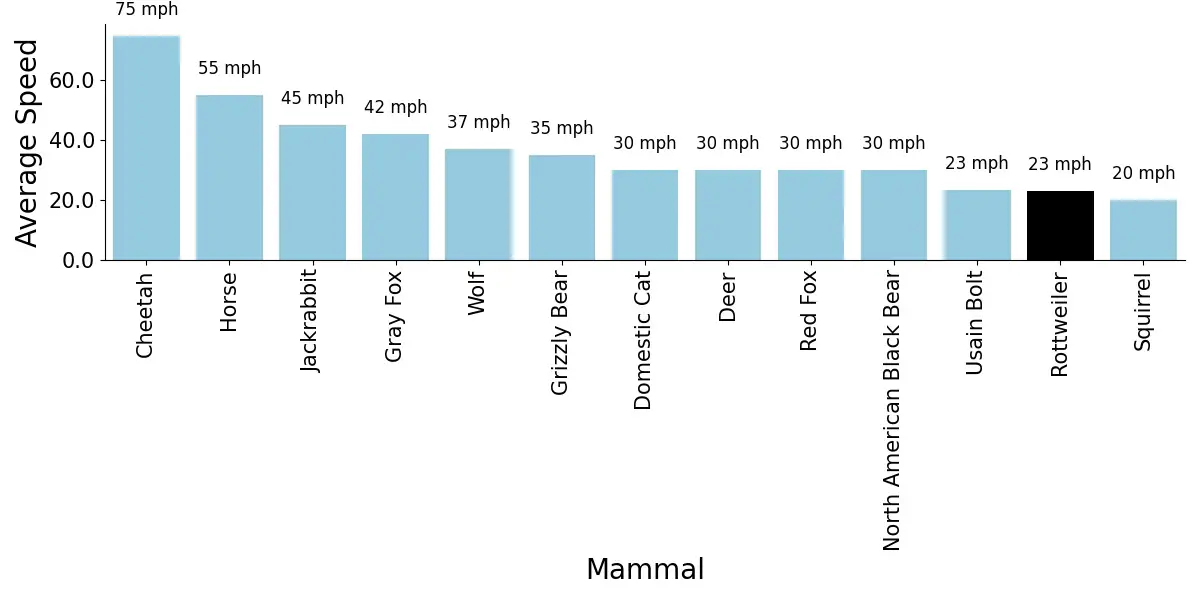
Good Names for Rottweilers
Here are some really good names that are typical for the Rottweiler ranked by popularity:
- Bear
- Zeus
- Rocco
- Rocko
- Max
- Hot
- Sampson
- Dog
- Apollo
- Dunkin
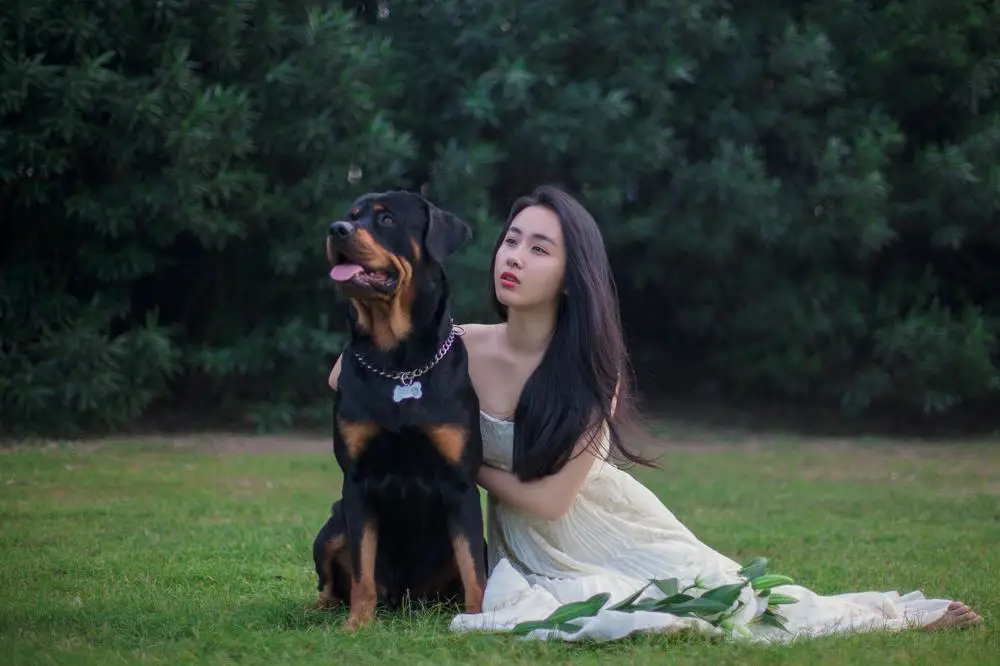
How Intelligent are Rottweilers?
| Rottweiler | |
|---|---|
| Intelligence Rank | 9 out of 130 dog breeds |
| Trainability | Tend To Learn New Commands After Fewer Than 5 Repetitions |
According to Prof. Stanley Coren, a Canadian psychology professor/dog trainer, the total intelligence that a dog demonstrates is the addition of three types of intelligence. These intelligence types are:
- Instinctive Intelligence: This is the natural intelligence that comes from instinct. For example, dog breeds that have been historically bred to be guard dogs will have a high `guarding` intelligence compared to dogs that were not bred for guarding.
- Adaptive Intelligence (learning and problem-solving ability): This indicates what a dog can learn to do for himself or herself. Adaptive intelligence is specific to each dog, and not breed specific. You can improve your dog`s adaptive intelligence by investing time to train your dog.
- Working/Obedience Intelligence: This type of intelligence is breed-specific. Certain dog breeds tend to have higher working/obedience intelligence than some other breeds. This intelligence is the closest to what we might call school-learning ability and it is based upon what the dog can learn to do when instructed by humans. This type of intelligence can be measured for each dog breed and compared to that of other dog breeds.
Professor Stanley Coren measured and ranked the working intelligence of about 130 different dog breeds.
Prof. Coren found that the Rottweiler has an obedience intelligence rank of 9 out of 130 dog breeds. Thus, Prof. Coren put Rottweilers in the `Brightest Dogs` category.
This means that Rottweilers tend to learn new commands after fewer than 5 repetitions.
However, we should mention that a dog should not be judged based on its intelligence alone. There are other important factors you need to consider when deciding on which dog breed to get. These other factors include sociability, adorability, and compatibility of the dog breed with your lifestyle.
See the intelligence ranking of some other dog breeds below:
| Breed | Intelligence Rank |
|---|---|
| Belgian Tervuren | 14 |
| Collie | 16 |
| German Shorthaired Pointer | 17 |
| Belgian Malinois | 22 |
| Pomeranian | 23 |
| Chesapeake Bay Retriever | 27 |
| Welsh Springer Spaniel | 31 |
| Samoyed | 33 |
| American Staffordshire Terrier | 34 |
| Curly-Coated Retriever | 41 |
| Bichon Frise | 45 |
| Scottish Deerhound | 47 |
| Norfolk Terrier | 56 |
| French Bulldog | 58 |
| Chinese Crested | 61 |
| Dandie Dinmont Terrier | 62 |
| Old English Sheepdog | 63 |
| Basset Hound | 71 |
| Bloodhound | 74 |
| Basenji | 78 |
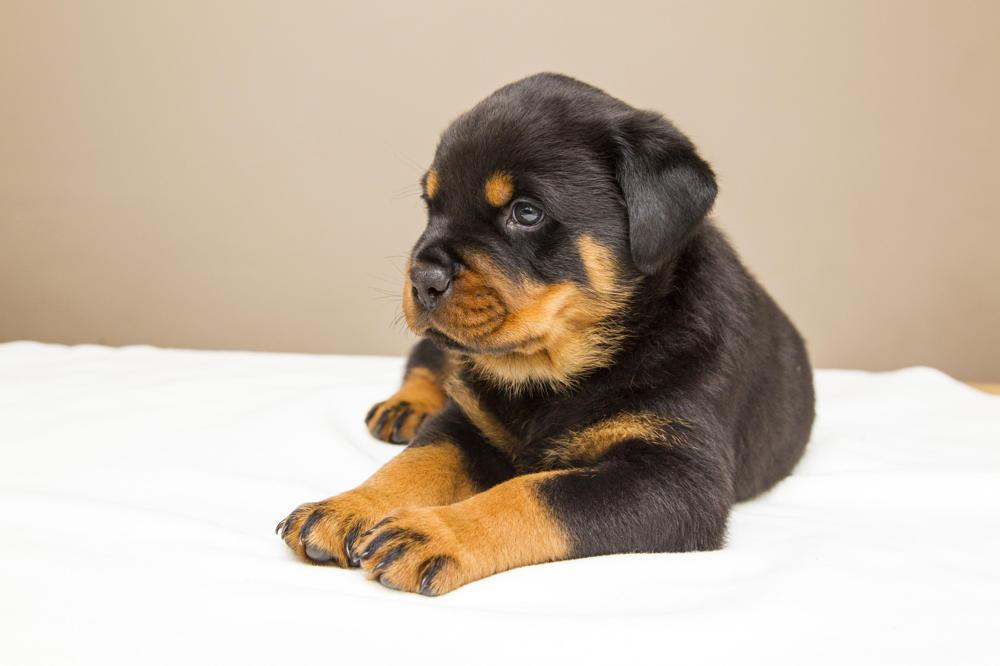
How Popular are Rottweilers with New Dog Owners?
Every year, the American Kennel Club (AKC) publishes information on how popular a dog breed is in that particular year. The AKC gets the popularity information of a breed from how many dogs of that breed the owners register with the AKC every year. The AKC collects this data for about 200 dog breeds.
The graph below shows the popularity trend of the Rottweiler.
The popularity of the Rottweiler averaged over the years is Number 8 out of about 200 dog breeds.
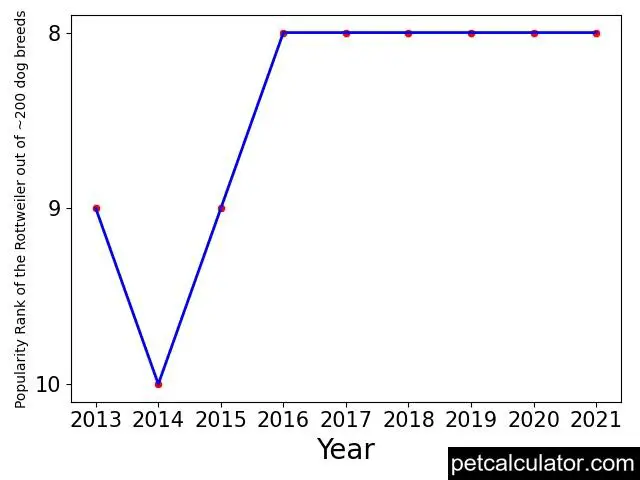
Do not get a dog breed just because it is a popular dog breed. And do not reject a dog breed just because it is an unpopular breed.
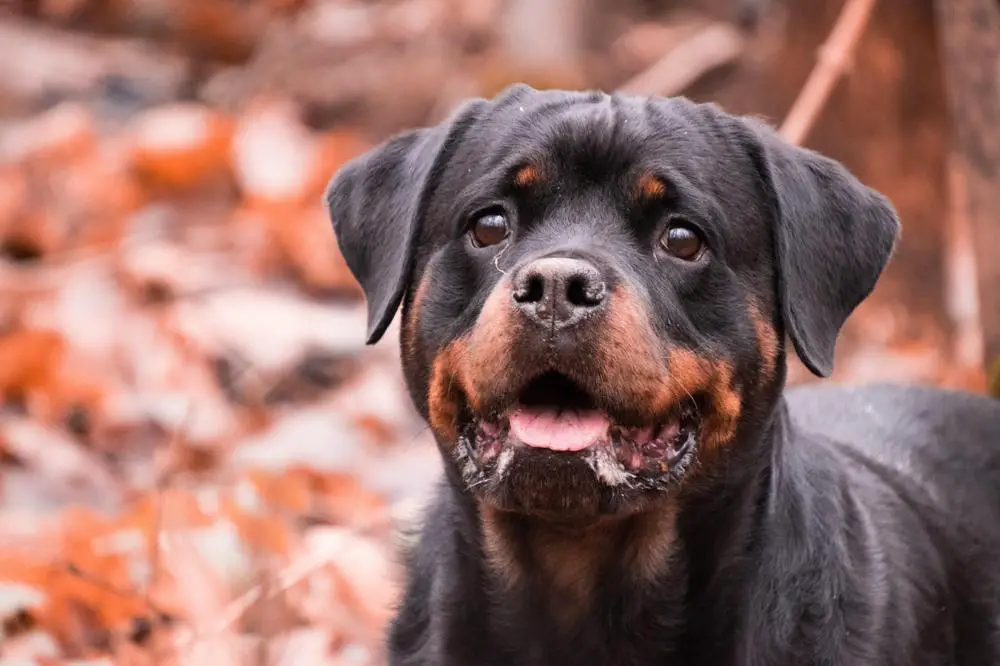
Health Problems in Rottweilers and How to Prevent Them
Every dog breed has its own set of health problems that it tends to develop. There is nothing like a perfect dog breed.
The Rottweiler is prone to certain genetic health conditions. The Orthopedic Foundation for Animals (OFA) is an organization that keeps track of genetic health problems in dog breeds.
From the extensive records that the OFA keeps, the OFA knows what health problems each dog breed is naturally prone to develop.
Hence, the OFA recommends which health screening breeders should perform on a dog breed to make sure that the breeders won`t breed `defective` dog parents that can pass down defective genes to their puppy offspring.
If you want a Rottweiler puppy that will grow up to be healthy, make sure that your Rottweiler breeder screens your puppy or your puppy`s parents for the health problems that the OFA recommends for your puppy`s breed. This will increase the chances that your puppy is free from genetic defects.
The following are the health tests that Orthopedic Foundation for Animals (OFA) recommends that breeders should screen Rottweilers for:
- Cardiac Evaluation (note minimum age of 24 months as requested by ARC effective 8/1/16)
- Elbow Dysplasia
- Eye Examination (note minimum age of 24 months as requested by ARC effective 8/1/16)
- Hip Dysplasia
- Juvenile Laryngeal Paralysis & Polyneuropathy (JLPP)
You can find out more about OFA`s recommended tests for Rottweilers here.

How to Take Care of Rottweiler
To take good care of your Rottweiler, you need to make sure that you groom your Rottweiler regularly.
Secondly, you need to find a veterinarian in your area that will routinely check the health status of your Rottweiler regularly, and give you appropriate recommendations on your Rottweiler`s preventative care.
Thirdly, you need to commit some time to exercise your Rottweiler daily. Regular exercise helps improve the health and quality of life of your Rottweiler.
Also, you need to feed your Rottweiler high-quality dog food, and the food should be of the right amount to prevent your Rottweiler from getting overweight or underweight.
See our recommendations on what to feed the Rottweiler and how much food to feed the Rottweiler at different life stages.
Finally, you need to make sure that your Rottweiler has access to clean water all the time. See our recommendations on how much water your Rottweiler needs to drink at different ages.
Dog Breeds That Are Similar to Rottweilers
If you have not made up your mind on which dog breed to get, you may also want to consider some other dogs similar to the Rottweiler.
We crunched the numbers and found that the following dog breeds that have similar behavior and temperament as the Rottweiler:
- Boxer (75 percent match with Rottweiler). Learn more about the Boxer here.
- Portuguese Pointer (74 percent match with Rottweiler). Learn more about the Portuguese Pointer here.
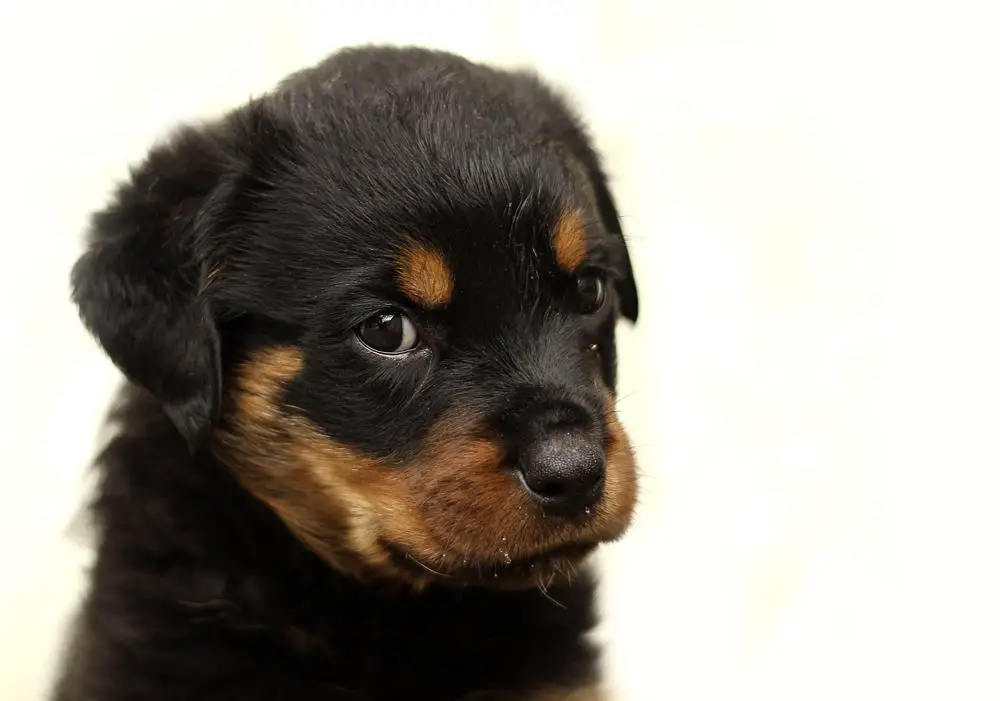
Other Things to Know About Rottweilers
Here are some of the very important characteristics of the Rottweiler that you need to know about the Rottweiler breed:


